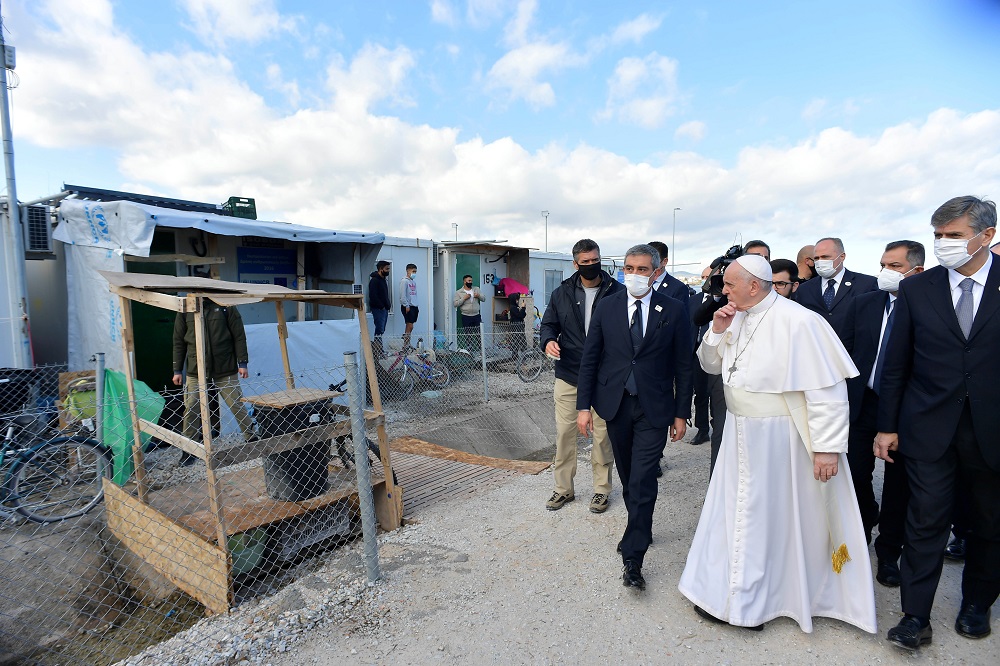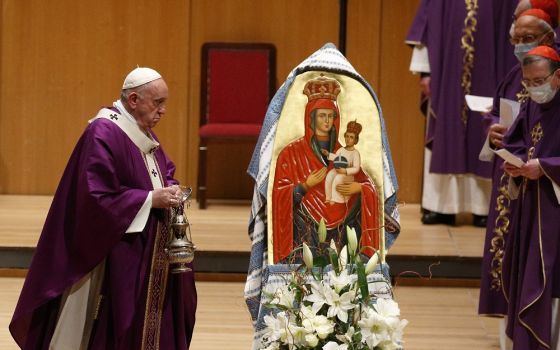Pope Francis greets a child as he visits with refugees at the government-run Reception and Identification Center in Mytilene, Greece, Dec. 5, 2021. (CNS photo/Vatican Media)
LESBOS, Greece — As he returned to an island that has become a symbol of Europe's refugee crisis, Pope Francis on Dec. 5 chided world leaders for their "cynical disregard" of the plight of migrants.
The pope's visit was brief and his message direct: Indifference kills.
"Stop ignoring reality, stop constantly shifting responsibility, stop passing off the issue of migration to others, as if it mattered to no one and was only a pointless burden to be shouldered by somebody else," Francis pleaded during his return visit.
Over the last decade, hundreds of thousands of refugees escaping violence across the Middle East have passed through Lesbos, many seeking permanent relocation in Europe. When Francis first visited in April 2016 — and memorably brought back 12 refugees back to the Vatican — 1.3 million people sought asylum in Europe that year.
"History teaches us that narrow self-interest and nationalism lead to disastrous consequences," said Francis during his two hours on the island.
As he spoke against a backdrop of refugee shelters along the shores of the Aegean Sea, Francis cited the global vaccination campaign and the fight against climate change, saying that while these efforts are at times stalled, he believes forward progress is being made.
"All this seems to be terribly absent when it comes to migration," he said. "Yet human lives, real people, are at stake!"
Advertisement
Two days ago during his visit to Cyprus, Francis criticized the use of barbed wires and likened the treatment of migrants to the torture in concentration camps. In Lesbos, where barbed wire fences had also been erected around the refugee camp, Francis turned to the words of a Holocaust survivor to again press his case.
"When human lives are endangered, when human dignity is in jeopardy, national borders become irrelevant,” Francis said, quoting the late Elie Wiesel.
At the time of his last visit, more than 5,000 migrants had died that year at sea as they attempted to cross from mainland Turkey over to Greece.
"Let us stop this shipwreck of civilization," urged Francis on Sunday.
"The Mediterranean, which for millennia has brought different peoples and distant lands together, is now becoming a grim cemetery without tombstones," he lamented. "This great basin of water, the cradle of so many civilizations, now looks like a mirror of death."
When Francis visited in 2016, Lesbos was home to the largest refugee camp in Europe until arsonists set fire to it in 2020, further crippling its already homeless population of 12,000.
At the newly built Reception and Identification Center on the island, where Francis spoke directly to its 2,200 residents, the pope said he refused to forget their plight. Prior to his speech, the pope spent nearly an hour walking the perimeter of the camp, often clasping the hands of small children and occasionally offering a "thumbs up" while posing for photographs.
As refugee families from Afghanistan, Syria, the Congo and elsewhere gathered under a white tent, Francis said he was "here to see your faces and look into your eyes. Eyes full of fear and expectancy, eyes that have seen violence and poverty, eyes carved by too many tears."
He begged others — especially political leaders of wealthy countries — not to turn away from their suffering.
"Let us combat at its root the dominant mindset that revolves around ourselves, our self-interest, personal and national, and becomes the measure and criterion of everything," Francis said.

Refugees stand outside their shelters as Pope Francis visits the government-run Reception and Identification Center in Mytilene, Greece, Dec. 5, 2021. (Vatican Media/CNS)
In a direct criticism of a recent proposal by some European leaders to erect fences to keep migrants from their borders, Francis said it was "distressing to hear of proposals that common funds be used to build walls."
"Problems are not resolved and coexistence improved by building walls higher, but by joining forces to care for others according to the concrete possibilities of each and in respect for the law," he said.
Instead, the pope said the root causes of violence and conflict that have forced migrants to leave their homelands should be addressed.
"Why do we fail to speak with equal vehemence about the exploitation of the poor, about seldom mentioned but often well-financed wars, about economic agreements where the people have to pay, about covert deals to traffic in arms and the trafficking of weapons?" he asked.
"The remote causes should be attacked," he continued, "not the poor people who pay the consequences and are even used for political propaganda."
Massimiliano Signifredi of the international Community of Sant'Egidio, which has welcomed nearly 200 refugees from Lesbos to Italy, told NCR that while Lesbos is geographically in Greece, the plight of migrants is "very far from the consciousness" of most Europeans.
Francis' return to the island, he said, "shows that refugees are in the heart of the church."
"Shake us from an individualism that excludes others, to awaken hearts that are deaf to the needs of our neighbors," Francis said as he concluded a rousing address meant to stir the consciences of global leaders and Catholics alike.
"I ask every man and woman, all of us," he said, "to overcome the paralysis of fear, the indifference that kills, the cynical disregard that nonchalantly condemns to death those on the fringes."
After departing Lesbos, Francis will return to Athens, where on Sunday afternoon he will celebrate the first papal Mass in the Greek capital in two decades before returning to the Vatican on Monday.




